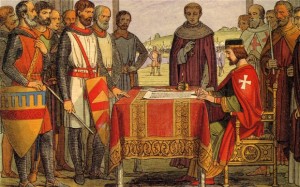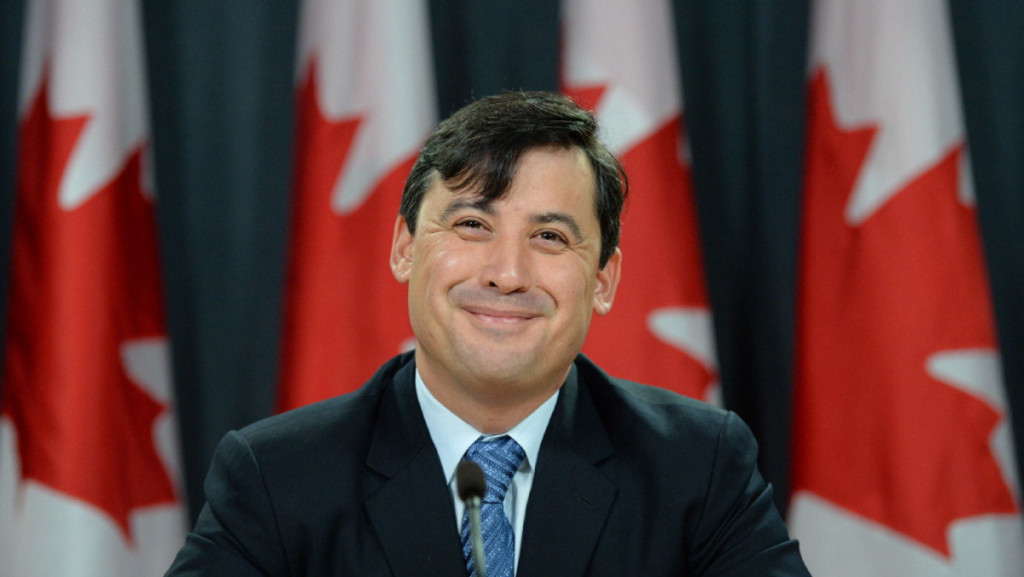 By Ray Rivers
By Ray Rivers
June 26, 2015
BURLINGTON, ON
I have a friend who would like nothing better than to see all political parties banned. Representatives should follow the wishes of the people who elected them, not be desk-thumping seals obeying the every whim of the prime minister and his entourage. For him, Canada’s federal government, with its powerful leadership clique and strict party discipline, best resembles a limited autocracy.

The signing of the Magna Carta – the document that began the process of taking power away from Kings
But is partisanship the culprit? Political parties are the wheels that have been driving the evolution of the democratic form, excepting the obscure Greek experiments with direct democracy. Not to downplay the importance of the Magna Carta, it was the Whig (Liberals) party in Britain which wrestled autocratic executive power away from the King, and brought us our modern parliamentary template.
So, perhaps, the issue has more to do with leadership style than governance structure. And, in that vein, my friend likes to blame Pierre Trudeau. He says that PET initiated the style, adopted by subsequent leaders, of absolute control over public policy and decision-making. And he is even more critical of Mr. Harper, who makes PET look like a wuss in this regard.
Ontario Tory back bencher and maverick, Michael Chong, finally got his private member’s Reform Act through the system. Chong held a couple of ministerial posts in the 2006 Conservative government before quitting Cabinet in disgust over the ‘Québécois nation motion’. Having doomed himself to eternal back-benching by his action, he then focused his creative juices on reforming the party system to rein in the near absolute power of party leaders.
I’ve never been a fan of government writing laws to regulate its own behaviour. Laws like the Mike Harris balanced budget legislation and the latest federal copycat version of that are good examples of bad legislation. Unworkable, impractical and unnecessary, there are enough holes in that federal budget law for the PM to drive a Mack truck through – as he did with his fixed elections date law.
I always figured that budgets were what we paid the government to sort out in our best interests. It’s their job, why do they need a law? And this so-called Reform Act is about how the party’s rule themselves. Mundane matters like selecting caucus chairs and nominating candidates are the stuff of this bill. Well, at least that is all that was left, after his own party got through with it.
Let’s remember that political parties are already governed under the Elections Act and by Elections Canada. There are stiff penalties for misdeeds, as Harper’s protege and former spokesperson, Dean Del Mastro, recently discovered. He is the winner of a month’s free room and board in the ‘Big House’ for breaking campaign spending rules and trying to cover it up.
When Justin Trudeau heard about potential sexual misconduct by two of his Liberal MPs, a while back, he immediately suspended them from his caucus. Under the Reform Act he now would not be able to do that without jumping through a bunch of hoops and hurdles. You be the judge if that makes us better off – but it sure did tick off Chong’s boss, and that may have been his main point.

Conservative MP Michael Chong introduced a bill that would give party caucuses significant powers – including the ability to vote out their leader – and it was actually passed by the House of Commons.
Chong, not only had to grovel to get this bill past his own party members in the House of Commons, but almost lost it in the Senate, where one Conservative senator threatened to kill it. Meanwhile the opposition parties were rubbing their hands and cheering him on. That tells us as much about the legislation as it does them.
And Mr. Chong objected to the bill being sent to the Senate, given that it only concerned procedures in the House of Commons, and the Senate has no authority over the lower house. Besides the Senate is a mess and has become a laughing stock. That institution can’t even manage itself let alone pass judgement on what goes on among MPs in the House of Commons.
It’s not just Duffy, who is still on trial, but all the other scoundrels scarfing down all the goodies to be snatched from the public trough. The person most likely to put Canada’s Senate out of its misery, the high polling NDP leader Mulcair, hasn’t announced whether that will be on his election platform this fall. But he and Saskatchewan’s premier Wall are sure making a lot of noise.
Interestingly Mr. Trudeau has taken the party out of the Senate, at least if they call themselves Liberals. That sounds a lot like what my friend was craving – replacing the thumping seals with non-partisan representatives. Except they’re not really representatives – don’t really represent anyone but themselves.
So long as senators are unelected, they will always be seen as patronage appointments – whatever their political colour. On the other hand, an elected Senate would compromise parliamentary decision-making, as indeed moving to an elected Senate has done in the USA. So more Canadians are coming to accept that it may not just the bath water, but this baby, which needs tossing out.
As for Chong’s law, it prescribes no new penalties, so the Election Act and Parliament of Canada Act are the fall backs. But I doubt Mr. Trudeau or Mr. Harper would serve jail time for expelling the next delinquent MP without having first put it to a vote in caucus. I’d give him a B+ for his good intentions, an A for effort and a C for the actual bill.
 Ray Rivers writes weekly on both federal and provincial politics, applying his more than 25 years as a federal bureaucrat to his thinking. Rivers was a candidate for provincial office in Burlington where he ran as a Liberal against Cam Jackson in 1995, the year Mike Harris and the Common Sense Revolution swept the province. Up until yesterday Rivers was president of the Flamborough – Glanbrook federal Liberal Association. We could not have a president of a federal constituency association writing an opinion column on the upcoming federal election – Rivers resigned the presidency of the association last night and will take a break during part of July and return in August – unless of course there is some breaking political news that stirs him from his summer slumber.
Ray Rivers writes weekly on both federal and provincial politics, applying his more than 25 years as a federal bureaucrat to his thinking. Rivers was a candidate for provincial office in Burlington where he ran as a Liberal against Cam Jackson in 1995, the year Mike Harris and the Common Sense Revolution swept the province. Up until yesterday Rivers was president of the Flamborough – Glanbrook federal Liberal Association. We could not have a president of a federal constituency association writing an opinion column on the upcoming federal election – Rivers resigned the presidency of the association last night and will take a break during part of July and return in August – unless of course there is some breaking political news that stirs him from his summer slumber.
Background links:
Chong’s Law Opposition Support Passing Chong’s Law
Trudeau’s Law Mulcair’s Law Harper’s Law















When are the Harper government and Mike Wallace going to get “straight” with voters? The lies and half-truths started during the pre-election in 2006 during one of Harper’s “political” Policy speeches;
Stephen Harper’s Broken Income Trust Promise
https://www.youtube.com/watch?v=2qvKZO0d0Ps
Mister Shulich pointed to the lies: | Schulich on Income Trusts
https://www.youtube.com/watch?v=C-AV4HhZbgw
Mike Wallace stood at the “Politicians’ table” at the seniors’ Center and proclaimed HE and HIS GOVERNMENT had to break the “protection” promise “in the interest of FAIRNESS.”
Who served on the Income Trust Committee Hearings in Parliament?
Brian Pallister—Chair
Diane Ablonczy—Member
Rick Dykstra—Member
Dean Del Mastro—Member
Mike Wallace—Member
I don’t think Chong’s bill is going to make one iota of difference in the end to the manner in which party politics are conducted.
It is a common misunderstanding that “Representatives should follow the wishes of the people who elected them..”.
Which people would that be? Obviously representatives should do what they believe to be best for the municipality/province/country and NOT what the most vocal citizens (or the biggest contributors to election campaigns) want them to do.
As I began reading this I wondered again if a case isn’t being made, intentionally or not, that government, no matter how it rearranges its chairs has become an almost opaque entity existing only because people continue to think it should exist. I flashed back to Hermann Hesse’s Nobel Prize winning work, Magister Ludi. We know they must be doing something important in there because they sure act like it. But a serious look into the inside, as this article provides, leaves one with the feeling of voyeurism into a strikingly dysfunctional household.
It was so nice to see Dean’s “Perp” walk on National TV. To think, that we only knew that he cheated because he tried to walk out of a $20k invoice. That is the only reason why his cheating came to light. If he had of paid the invoice, we would have not known that he cheated.
As they reported on the news, Harper has cheated in the last three elections, 1) The in and out scam, 2) Dean (are their more?), 3) Robo calls trying to prevent voting.
There are 17 more CON’s in trouble with the law or under investigation. So many that the CON in Conservative will soon stand for CONVICT!
Sad really, but should we have expected anything else from Harper who really wanted a dictatorship, like our dear leader in North Korea.
Again, really really enjoyed that “Perp” walk on the National News. Who’s next? That’s the tough question, with so many to choose from. I think either Pam or Mike. lol.